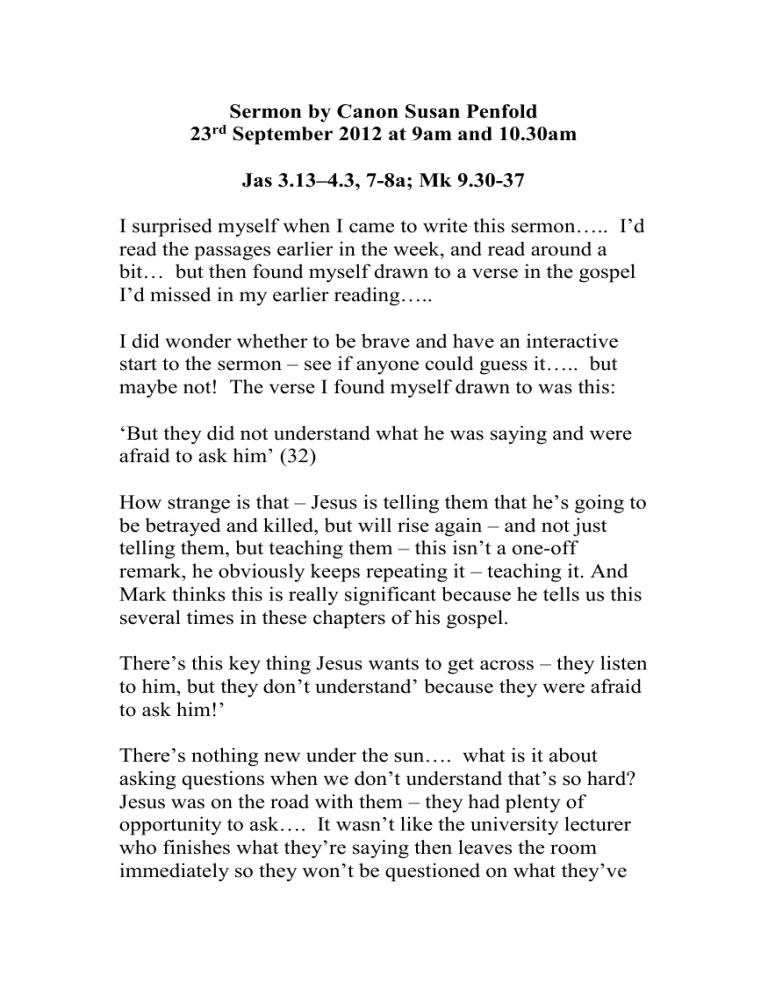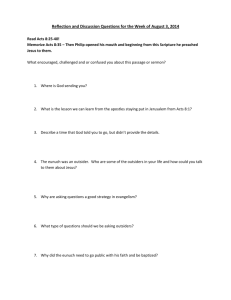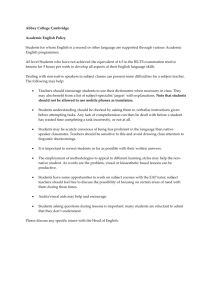The Sixteenth Sunday After Trinity

Sermon by Canon Susan Penfold
23 rd September 2012 at 9am and 10.30am
Jas 3.13–4.3, 7-8a; Mk 9.30-37
I surprised myself when I came to write this sermon….. I’d read the passages earlier in the week, and read around a bit… but then found myself drawn to a verse in the gospel
I’d missed in my earlier reading…..
I did wonder whether to be brave and have an interactive start to the sermon – see if anyone could guess it….. but maybe not! The verse I found myself drawn to was this:
‘But they did not understand what he was saying and were afraid to ask him’ (32)
How strange is that – Jesus is telling them that he’s going to be betrayed and killed, but will rise again – and not just telling them, but teaching them – this isn’t a one-off remark, he obviously keeps repeating it – teaching it. And
Mark thinks this is really significant because he tells us this several times in these chapters of his gospel.
There’s this key thing Jesus wants to get across – they listen to him, but they don’t understand’ because they were afraid to ask him!’
There’s nothing new under the sun…. what is it about asking questions when we don’t understand that’s so hard?
Jesus was on the road with them – they had plenty of opportunity to ask…. It wasn’t like the university lecturer who finishes what they’re saying then leaves the room immediately so they won’t be questioned on what they’ve
said…. In case they don’t know the answers…. That certainly happened in my day!
The disciples had plenty of opportunity – they didn’t understand – but they still didn’t ask. Even though it was obviously something very important to Jesus…..
I suspect we’re still the same today – we don’t ask nearly enough questions – especially when it comes to faith.
Why not?
Well, one reason is that it requires mental effort – there’s a famous quote from Bertrand Russell:
People would rather die than think; most do
And if it’s Bertrand Russell that means it’s not just in the church that people don’t like thinking!
So questions means thinking and thinking is hard work….. but there’s also the worry that asking questions means that you have to admit that you don’t know everything – you could interpret it that way – or instead you could say that asking questions isn’t a sign of lack of intelligence….
Rather it’s evidence of a curious and lively mind. That’s certainly true in the area of scientific research – new discoveries come from people who are prepared to ‘think outside the box’ – to ask the questions that no-one else has thought of asking.
Asking questions increases the sum of human knowledge – or it does in the world around us. Is it different when it comes to questions of faith? Some people think it is – they think that asking questions is evidence of doubt – that faith
2
is God-given and that you shouldn’t question it – even when the questions seem blindingly obvious.
Perhaps that’s why I was drawn to this verse…. ‘they were afraid to ask’ – they were being told a vital aspect of faith – the betrayal, death and resurrection of Jesus – they didn’t understand – they didn’t accept it as an article of faith, they just ignored it.
Because they were afraid to ask – I think the implication is that they should have asked.
The more I’ve worked on this sermon, and thought about where it fits in with the rest of Scripture, the more puzzled
I’m becoming about why we don’t ask more questions….
Because surely asking questions is about the search for understanding – the search for wisdom – the search for truth.
And Jesus seems to be encouraging that – you can quote particular verses like ‘ask and you will receive, seek and you will find’ – or you could look at the whole tenor of
Jesus teaching – yes, he does tell them things, but often he helps them to learn by asking questions himself ‘who do people say that I am?’ ‘The baptism of John, was it from
God or of human origin?’
Two questions at random – there are lots of others…..
Jesus encourages the asking of questions in the search for truth – he also describes himself as ‘the truth’….. and he tells them that knowing the truth will set them free.
The sort of questions that lead to the truth are absolutely vital – we ought to ask.
3
And actually that’s as true of seeking the truth in the world around as it is in seeking the truth about God – it’s deeply significant that it was the Bishop of Liverpool who chaired the group that discovered more of the truth about what happened after the Hillsborough disaster. Seeking the truth is part of the gospel – including the hard truths of sin – because how else do you get repentance and forgiveness?
And how else do you get the new life of the kingdom, where evil is no more?
Questions….seeking the truth is important.
It’s important for us – and it’s often important for people outside the Church… Maybe if we were more open to asking questions it would be easier for others to join us – I don’t know what response you’re getting to your invitations to ‘Back to Church Sunday’ next week – but I suspect that one of the things that holds people back is a sense that their questions won’t be taken seriously – that you have to get everything sorted out before you can go to Church – heaven help us if we think we’re people who’ve got all the answers
– who know how things work – and just ignore the bits we don’t understand.
Which is what those disciples in our gospel were doing.
Jesus is teaching them that he will be betrayed and killed and rise again. They don’t understand it – so instead of asking questions they ignore it and focus instead on what they think the kingdom is going to be like.
They still think this is a human kingdom, and that they’re in line for the top jobs – so they’re squabbling about who gets
4
which one – it’s a bit like the infighting over a cabinet reshuffle.
It’s all totally irrelevant – and worse than irrelevant, it’s ignoring the enormous cost of the Kingdom to Jesus. I wonder how he felt as he tried to explain all that was going to happen – the terrible things that were going to happen, and the suffering for him – and his closest friends didn’t want to know. All they were interested in was who was going to get the top jobs in the Kingdom…. They’d got it completely wrong - this isn’t a human kingdom – it’s a kingdom of hearts and minds, of transforming society from within, one person at a time. Where’s the top job there?
Maybe if we asked more questions, we’d be more likely to get it right? Or asked the right questions….
The question the disciples are asking is ‘who is the greatest?’ They’ve understood so little that it’s the wrong question. They’re still out for their own gain – and you can read the epistle again later to find a condemnation of that!
The question they should have asked isn’t ‘who’s the greatest’ – instead they should have asked ‘how can anyone be great in the Kingdom of God’.
And that’s the question Jesus answers, both by his words and his actions. The greatest is the servant of all – and the servant serves those who are seen as least of all – in this case a small child.
5
I think this verse eventually jumped out because I know that I have a tendency to keep asking the question ‘why’ – and I’m sure it must be annoying sometimes – it’s a hangover from the disciplines of scientific research – at least that’s my excuse – but it sometimes feels like being a perpetual two-year-old.
That’s OK – even two year olds have an honoured place in the Kingdom of God.
Whoever welcomes one such child in my name welcomes me, and whoever welcomes me welcomes not me, but the one who sent me.
You will know the truth – and the truth will set you free.
So keep asking the questions – until you find the right questions. Because those questions will lead to the right answers….
6








